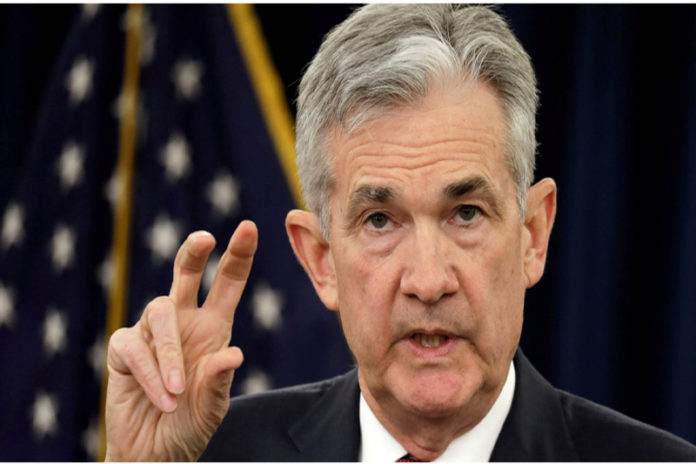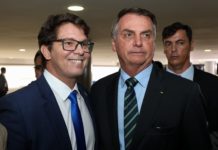President of the U.S. central bank states that it will be flexible with interest and that it won’t even resign that Trump asks
RAJESH PATHAK
Wall Street is restless and investors are concerned about the global crisis’s doubts. The U.S. stock exchange accumulates losses of 20% in the last quarter. Oil has also plummeted, political tensions in Washington do not help the economy, and China’s growth slows down without even registering the effects of the commercial war. The president of the Federal reserve (the Fed, central Bank of the USA), Jerome Powell, asked on Friday “patience” to the markets and proved willing to change his policy of increasing interest if the climate worsened. Wall Street responded with gains exceeding 3% after losses on the eve.
Meanwhile, in Brazil, the euphoria with the arrival of Jair Bolsonaro and his liberal agenda was still the keynote of the week on the São Paulo Stock Exchange, which beat consecutive records. On Friday, however, there were already signs of the first noises. The investors began the day of bad humor, reacting to the statements of the new president that defends a pension reform more lenient than the desired by its economic team. The doubts ventilated by the new occupant of the plateau on the agreement between the Brazilian Embraer and Boeing also made the actions of the Brazilian company fall. Everything only improved with Powell’s statement of interest in the U.S.-the data matters to BOVESPA because higher rates in the North American market can attract resources applied in other economies, such as Brazilian.
The Fed president attempted to soothe the temperance by stating that he will be “patient” when assessing the risks of market concern for a global slowdown. At the same time, he was optimistic in stating that the expansion will continue above the potential in 2019 despite anticipating a moderation. Wall Street has many things to digest by determining the direction of the United States economy, especially after Apple’s warning to investors for their business in China.
Investors are nervous and doubts increase on the global crisis. The markets have been expressing concern over the course of monetary policy in the US for three months, the economic downturn of China, the impact of trade tensions and the political chaos that dominates in Washington. Powell considers, however, that the feeling of investors is ahead of the data, and these contradictory signs complicate their work. “We will be patients when assessing the performance of the economy,” he said in referring to the progress of the strategy. In this sense, he said, will be sensible and is open to make changes if necessary. “We are always prepared to change the direction of our monetary policy in a meaningful way if it is necessary,” he said, at the same time he stressed that economic data remains solid. Powell said the FED is ready “to adjust its (monetary) policy quickly and flexibly.”
Wall Street Recovery
Powell intervened at a roundtable with Yellen and Bernanke organized in Atlanta by the American Economics Association. His comments were received with relief by Wall Street, which increased by more than 2.5% after the abruption drop of almost 3% on the eve. In the exchange they make sure that the next increase in interest will not be imminent. The last increase was decided in December, to situate them between 2.25% and 2.5%.
President Donald Trump did not hesitate a second to proclaim that the resumption of the exchange was the merit of the plans he had to bring growth above 3%. But now that the markets go in the opposite direction, divide the guilt with others. The first goal of his attack was to criticize the Federal reserve for increasing interest. He came to say it was the biggest problem in the economy.
But this week began to admit that there are other factors that create anxiety among investors. “Our country is far better than others in the world,” he said during his cabinet meeting on Wednesday, “everyone talks about us.” To later say that despite the December stumbling, the markets are 30% higher than when they were elected president.
From there he predicted that Wall Street will rise again when “business issues are resolved”. The Republican has so far denied that the U.S.-China tariff war was a risk factor for economic growth. The two powers settled on December 1 a three-month truce to negotiate a pact that would allow the dispute to end.
Fear of the Chinese slowdown
Apple’s alert to its investors perfectly reflects the fears that dominate the stock market. Tim Cook, the chief executive, expressly cited the decline in growth in China as the main factor that led him to demote the profit projection for the Christmas shopping quarter. And he warned that commercial litigation only added more pressure to the situation.
Despite the tension that dominates on Wall Street, the December employment data shows that the economy advances with solidity. The members of the Federal reserve who spoke this week claim that they listen to the market “carefully” and therefore try to incorporate these risks into their strategy. They also say that no one expects a 3% growth as in the last exercise in the United States.
This moderation, they say, does not mean that you walk into a recession. Larry Kudlow, chief economic advisor to Donald Trump, made the same statement by evaluating the employment data and considers that the fears of the market are exaggerated. It also states that companies are “investing heavily”. You think Apple’s problem with China is that its technology has reached a limit and has more competitors.
Kevin Hassett, chief economist of the White House, does not discard, however, that other large multinationals follow Apple’s path and show in the results the effect of the slowdown in China’s economy. “It will be bad for the profits of American companies,” he said. This, in his opinion, puts at the same time “a lot of pressure in China to make a trade pact” with the US.
Jerome Powell hinted that there is no urgency to increase interest rates faster, because inflation gives leeway and because current interest is already very close to a neutral position. And even though the data continues to be solid in general, it admits that there are many currents in play, some of which feed the uncertainty. So he reiterated that the challenge is to win a balance.
Mr. Powell, like Cook, is hoping that you can get a deal on the commercial front that will allow us to end the uncertainty. And it made it clear that the Fed’s culture is robust and will not be carried away by political pressures. He also said he doesn’t think to resign if Trump asks. Yellen said she expects to end the criticism against the central bank so that the work of the institution is not questioned.















